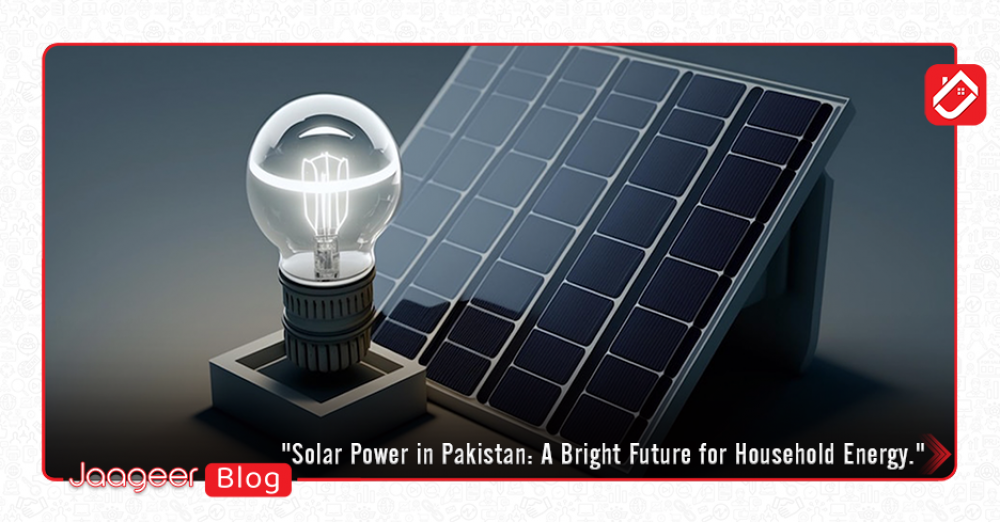In a world where energy conservation and sustainability are seemly increasingly life-sustaining, Pakistan is harnessing the powerfulness of the sun to illuminate a brighter future. Solar power in Pakistan has emerged as a game-changer, not only for large-scale projects but also for households looking to reduce their carbon footprint and energy bills. In this comprehensive draw, we'll delve into the solar power revolution in Pakistan, exploring its benefits, challenges, and the promising future it holds for households.
Solar power, erst a futuristic concept, is now a touchable reality in Pakistan. The country's abundant sunlight and the increasing demand for sustainable energy solutions paved the way for a solar power revolution. This clause explores the current landscape of solar energy in Pakistan, emphasizing its significance for households.

The Solar Energy Landscape in Pakistan
Government Initiatives and Policies
The Pakistani government has been proactive in promoting solar energy adoption. Incentives such as tax breaks and net metering policies have encouraged both individuals and businesses to invest in solar power systems.
Solar Potential in Pakistan
Pakistan boasts one of the highest solar irradiance levels globally, making it an apotheosis location for solar vim production. With approximately 320 sunny years per year, the potential for harnessing solar energy is immense.
Advantages of Solar Power for Households
Cost Savings
One of the most substantial advantages of solar power is the potential for substantial cost savings on electricity bills. Solar panels allow households to generate their power, reducing their dependence on the grid.
Environmentally Friendly
The solar power is sportsmanlike and renewable, producing zero greenhouse gas emissions. By adopting solar energy, households contribute to a cleaner environment and combat climate change.
Energy Independence
Solar power grants household’senergy independence. They are no longer at the mercy of power outages or rising electricity costs, giving them greater control over their muscular needs.
Installing Solar Panels at Home
Selecting the Right Solar System
Choosing the right solar system for your place is crucial. Factors like vitality expenditure, budget, and available space want to be considered. Consulting with a solar expert can help you make an informed decision.
Installation Process
Solar panel installation involves mounting panels on your rooftop and connecting them to an inverter. The process is relatively straightforward and can be completed by professionals within a few days.
Maintenance and Upkeep
Regular maintenance ensures the longevity and efficiency of your solar system. Cleaning panels, checking for dust and debris, and inspecting the inverter are essential tasks for optimal performance.

Challenges and Solutions
Intermittent Power Supply
Pakistan faces intermittent powerfulness issues, which can pose a challenge for solar power users. Battery storage solutions and hybrid systems can mitigate this problem by providing uninterrupted power during outages.
Affordability
While the initial be of installing solar panels may seem high, the long-term savings outweigh the investment. Government incentives and financing options make solar power more approachable to a broader audience.
Technical Know-How
Some homeowners may be apprehensive about solar technology's complexity. However, solar companies offer comprehensive living, from scheme pattern to installation and maintenance.
Solar Power Success Stories
Highlighting real-life success stories of households that have embraced solar power can encourage others to follow suit.
The Road Ahead for Solar Energy in Pakistan
Future Projections
The future of solar energy in Pakistan looks promising. As technology advances and costs decrease, more households are expected to modulate solar power.
Integration with the Grid
The integration of solar power into the national gridiron is an ongoing effort. This will enable surplus energy generated by households to be fed back into the grid, further reducing electricity bills.
Conclusion
Solar power in Pakistan is not just a source of renewable vitality; it represents a brighter and more sustainable future. By harnessing the power of the sun, households can reduce costs, reduce their carbon footprint, and gain energy independence.
FAQs
Is solar power suitable for all regions of Pakistan? Solar power is viable in most regions of Pakistan due to the country's abundant sunlight. However, the efficiency of solar panels may vary slightly depending on location. What is net metering, and how does it benefit solar power users? Net metering allows solar power users to sell excess electricity support to the grid, earning credits on their bills. It promotes energy conservation and savings. Are government incentives uncommitted for residential solar installations? Yes, the administration offers various incentives, including tax breaks and subsidies, to encourage residential solar installations. How long does a typical solar venire installation take? The installation process usually takes a few days, depending on the complexity of the scheme and the size of the installation. What is the lifespan of solar panels, and do they require frequent replacement? Solar panels have a lifespan of 25-30 years and require minimal maintenance. They do not need frequent replacement if properly cared for.







